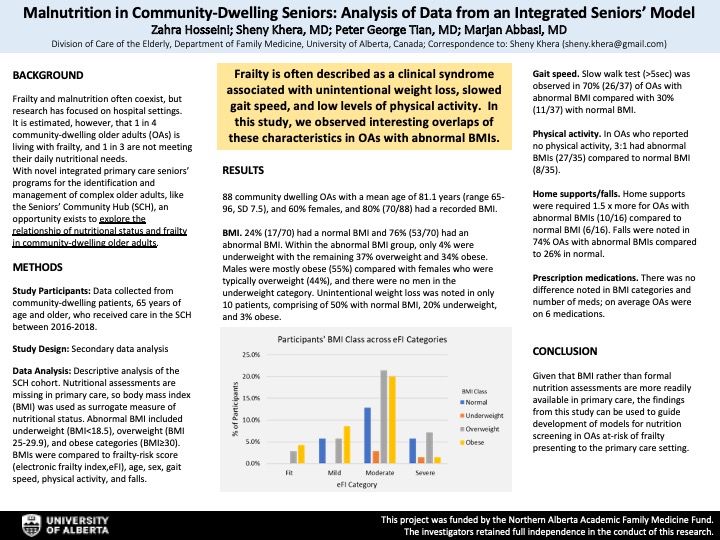PRP054: Malnutrition in community-dwelling seniors living with frailty: analysis from an integrated primary care seniors’ program
Sheny Khera, MD; marjan abbasi; Zahra Hosseini; Peter Tian, MD, MSc
Abstract
Context: Malnutrition and frailty often co-exist, and both have significant health impacts. However, the common and distinct aspects of this relationship are not well understood, and the focus of existing research has been in hospital settings. With novel, integrated primary care models for the identification and management of complex older adults, an opportunity exists to explore the relationship of malnutrition and frailty in community-dwelling older adults. Objective: To describe the nutritional status, biopsychosocial factors, and degree of frailty in community-dwelling older adults in an integrated primary care seniors’ program. Study Design: Secondary data analysis of the Seniors’ Community Hub (SCH) pilot project dataset. Setting/Dataset: The SCH is a nationally awarded integrated primary care seniors’ model that was piloted within a community-based clinic of six family physicians’ practices in Edmonton, Alberta, Canada. We will analyze the data of all the patients 65 years of age or older seen in the SCH from 2016-2018. The SCH dataset includes multiple variables such as frailty risk score, responses to nutritional screening questions, BMI, age, sex, home environment, education, gait speed, medications, social isolation, mental health, comorbidities, and functional abilities. Data also includes results from the SCH team-based modified comprehensive geriatric assessment (mCGA) that includes nutritional/ environmental/ functional/ psychosocial and cognitive assessments and recommendations. Population studied: The SCH pilot dataset includes eligible older adults from the participating clinic who were 65 years of age and older, community-dwelling, had an electronic frailty index (eFI) score of >0.12 (i.e., at risk of frailty), and provided consent. Patients were excluded if they were under 65 years of age, did not provide consent to participate in the SCH, eFI (0–0.12), or were living in a long-term care facility at the time of enrollment. Outcome Measures: Descriptive and correlative analyses between degree of frailty, nutritional status, and other biopsychosocial factors. Anticipated Results: We will describe the association among common and distinct characteristics of community-dwelling older adults with malnutrition and frailty. This study will guide future interventional studies on nutrition and frailty for at-risk older adults presenting to the primary care setting.

Diane Harper
harperdi@med.umich.edu 11/21/2021Thank you for sharing with us at NAPCRG.